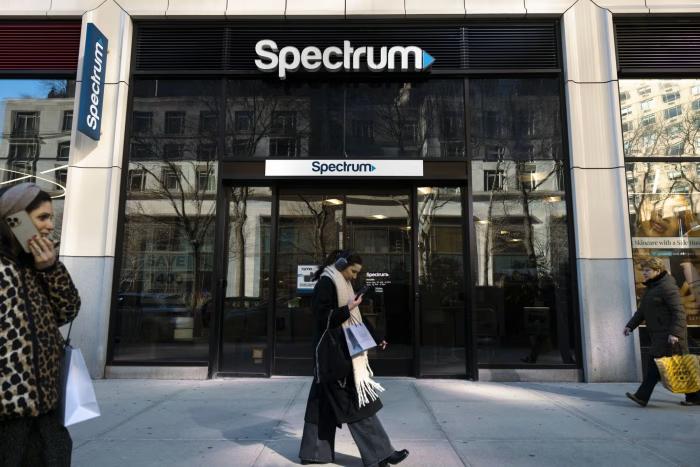Charter Communications, one of the largest cable and internet service providers in the United States, has recently faced a significant setback. The company reported a modest growth in its latest quarterly results, but it also revealed a surprising loss in broadband subscribers. This unexpected development led to a steep sell-off in its stock, signaling investor concern over the company’s future growth.
Let’s break down what happened, why it matters, and what it could mean for Charter Communications moving forward.
A Quick Overview of Charter Communications
Charter Communications is a major player in the telecommunications industry. Operating under the brand name Spectrum, it provides services like cable television, high-speed internet, and phone service to millions of households and businesses across the U.S.
For years, broadband has been the key growth driver for Charter. As more people cut the cord on traditional cable TV and move towards online streaming, companies like Charter have leaned heavily on internet services to keep revenue and subscriber numbers growing.
That’s why the news of a broadband loss came as such a shock to investors.
What the Numbers Say
In its latest earnings report, Charter Communications showed:
- Revenue Growth: Revenue rose by a modest 0.4% year-over-year to $13.55 billion.
- Net Income: The company posted a net income of $1.22 billion, which was higher than analyst expectations.
- Broadband Subscribers: Charter lost 63,000 residential broadband customers during the quarter — a key metric that had previously shown consistent growth.
Despite meeting or exceeding some financial expectations, the broadband loss overshadowed everything else in the report.
Why the Broadband Loss Matters So Much
Broadband is not just another service; it’s the core of Charter’s business model. As TV subscribers have steadily declined, internet services have become the backbone of Charter’s revenue stream.
A few reasons why broadband performance is so critical:
- High Profit Margins: Broadband has a much higher profit margin than TV services.
- Growth Engine: Most of the company’s recent growth has been tied to new internet subscribers.
- Market Expectations: Investors expect steady or increasing broadband numbers — a loss is seen as a red flag.
So, when Charter announced a drop in broadband subscribers, it sent shockwaves through Wall Street.
The Market Reaction: Steep Sell-Off
Charter Communications’ stock took a major hit following the earnings announcement. The company’s shares dropped nearly 15% in a single day — one of its steepest declines in recent years.
This sharp sell-off wiped out billions in market value and reflected deep concerns among investors.
Analysts reacted quickly:
- Bank of America downgraded Charter’s stock rating from “Buy” to “Neutral.”
- Morgan Stanley called the broadband loss “a sign of deeper structural issues.”
- Goldman Sachs reduced its price target for Charter shares by over 10%.
This wasn’t just about a bad quarter — it raised questions about Charter’s long-term growth potential.
Why Did Charter Lose Broadband Subscribers?

There isn’t just one reason for the broadband loss. Several factors may have contributed to the decline:
1. Increased Competition
Charter is facing tough competition from multiple fronts:
- Fiber-optic providers like AT&T and Verizon offer faster internet speeds.
- Wireless 5G home internet services from T-Mobile and Verizon are gaining traction.
- Smaller, local ISPs are aggressively expanding in suburban and rural areas.
2. Market Saturation
In many areas, Charter already has a strong presence. Simply put, there aren’t many new customers left to sign up. Without expanding into new territories, growth may continue to slow.
3. Economic Pressure
High inflation and cost-of-living pressures may also be forcing some households to cut back on internet services or switch to cheaper alternatives.
4. Regulatory Issues
In some states, municipal broadband initiatives are giving people more options. These community-run networks offer affordable internet and are becoming more popular, especially in underserved areas.
Charter’s Response and Forward Strategy
In a call with investors, Charter CEO Chris Winfrey acknowledged the loss but remained optimistic.
“We believe this is a temporary slowdown. Our long-term broadband strategy remains strong.”
Here’s what Charter plans to do:
1. Invest in Rural Expansion
Charter is using funds from the Rural Digital Opportunity Fund (RDOF) to expand its network into new, less-competitive areas. This could help bring in new customers and reduce churn.
2. Upgrade Infrastructure
The company is rolling out DOCSIS 4.0 technology, which will boost internet speeds and make the network more competitive with fiber-optic services.
3. Bundle Services
Charter is focusing on bundling its internet services with mobile plans and streaming options, which could offer better value to customers and reduce churn.
4. Customer Retention Campaigns
They’re investing in customer service improvements and discounts for long-term customers to reduce cancellations and win back lost users.
What This Means for the Telecom Industry

Charter Communications’ broadband loss is not just a company-specific issue — it could signal a shift in the telecom landscape.
Other providers may face similar challenges:
- Broadband saturation is becoming more common.
- 5G home internet is emerging as a serious competitor.
- Consumers are demanding faster, cheaper, and more flexible options.
This environment puts pressure on traditional cable and internet providers to innovate or risk losing relevance.
What Investors Should Watch Next
If you’re following Charter Communications or investing in the telecom space, here are a few key things to monitor:
1. Next Quarter’s Subscriber Numbers
Will broadband losses continue, or was this a one-time dip? The next earnings report will be critical.
2. Rural Expansion Progress
How quickly and effectively Charter can expand into new areas could determine whether it regains growth momentum.
3. Competition from 5G and Fiber
Keep an eye on how aggressively competitors like T-Mobile and AT&T are growing their customer base.
4. Stock Stability
After the sell-off, Charter’s stock is under pressure. Investor sentiment could remain shaky until the company shows signs of turning the tide.
Conclusion: A Wake-Up Call for Charter Communications
The recent Charter Communications broadband loss has shaken investor confidence and triggered a significant market reaction. While the company still has solid fundamentals and a long-term plan, the surprising subscriber decline shows just how fragile growth can be in today’s highly competitive and saturated telecom market.
Charter now faces a clear challenge: adapt quickly, or risk falling behind. Whether it’s through rural expansion, better technology, or competitive bundling, the next few quarters will reveal whether Charter can stabilize its broadband base and return to growth.
For consumers, this may mean more options and better deals as telecom giants fight for market share. For investors, however, it’s a stark reminder that even strong companies can stumble — especially when their core product stops growing.
Read Next – Remy Cointreau Softens Tariff Impact Despite Trade Tensions






